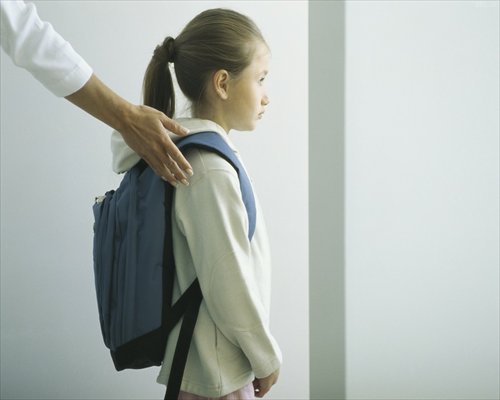To catch a predator

China's lack of any legal requirement for foreign teachers to submit background checks during their recruitment has allowed sex offenders into classrooms. Photo: IC
Former Beijing teacher Neil Robinson was jailed for 12 years for sex offenses and possession of child pornography on January 10. His imprisonment marked the final chapter of a bitter saga that began when the 47-year-old went on the run in 2002 and eluded capture for more than a decade. Robinson, who taught at the Beijing World Youth Academy (BWYA) from 2008 to 2012, turned himself in to Beijing police in April last year after being exposed on social media as a fugitive.
"I was astonished to hear the news [about Robinson]. How could a child molester with a criminal history be employed as a teacher?" asked a mother surnamed Zhao, whose son attends an international school in Beijing she asked not to be named.
Robinson's case was one of several to rock China last year involving foreign sex offenders employed as teachers.
In addition to sparking outcry from parents and anger at school administrators, the cases reignited calls for stricter background checks on foreign teachers in China.
But nearly a year on, suspicion remains high among parents of foreign teachers, who are seldom subjected to background checks by some schools that place the prestige of foreign faces above students' safety.
Silencing victims' voices
A BWYA spokesperson confirmed Robinson worked for three years at the school without complaint from students or parents before he left in 2012. Phone calls and interview requests over e-mail from Metropolitan to BWYA were not answered.
"I'm worried that even though nearly a year has passed since Robinson's exposure, the school hasn't dealt with the incident properly or given a frank explanation to parents," said Zhao, who added a BWYA administrator had declined requests to discuss the affair with concerned parents on instant messaging service QQ.
In addition to some schools covering up abuse claims, many Chinese children and parents are reluctant to speak out about such cases amid fear allegations will bring unwelcome publicity or not be handled seriously.
Caught on the prowl
When Wayne Prete worked as a teacher in 2009 at a private English school in Nanjing, Jiangsu Province, he knew there was something suspicious about fellow American teacher Wesley Lowe.
Aside from living with two Chinese women and their prepubescent children in his apartment, there was something else about Lowe that led Prete to believe he wasn't fit to be around children.
Prete decided to do what the school, Web International English, should have done and checked the US federal registry of sex offenders online.
His hunch was correct: Lowe had convictions in three states for crimes related to obscenity and child pornography.
"Three years before the case was exposed in 2013, I reported Lowe to the school and local police, but neither did anything," Prete, who now works as a building contractor in Florida, told Metropolitan.
When school administrators refused to fire Lowe, Prete threatened to distribute pamphlets to parents at the school gate informing them about the 63-year-old sex offender.
Lowe was eventually transferred to another school in Nanjing, where he taught for a further three years before leaving China in January 2013.
Prete never regretted his decision to blow the whistle on Lowe, even though he was intimidated by a group of American pedophiles in Nanjing.
"Men in the pedophile ring began to threaten me with physical harm and tried to cause me difficulties because I exposed them. They threatened to attack me if I didn't stop. At the time, my wife was pregnant with our son. They were threatening me and her. It was terrible to go through," Prete recalled.

The exposure of several foreign sex offenders employed as teachers in China last year has led some parents to question the safety of their children. Photo: IC
Probing teachers' backgrounds
A British teacher at an international school in Beijing, who requested anonymity, claimed his school allowed him to work for a year without requesting a background check.
"The school originally left it to me to arrange criminal record certificates from the UK and China. I had difficulty doing this and eventually forgot about it, meaning I worked the entire year with children despite the school having no proof that I was not a criminal," said the teacher, who has lived in Beijing since 2008 and worked at his current school since 2012.
"I thought if Chinese parents knew the school allowed this they would be reluctant to send their children to school in confidence."
The teacher said he found it "disgusting and astounding" when he learned some of his colleagues were in relationships with girls aged 16 to 18 at the school.
"I am certain there are teachers … who may be a danger to children. In conversation with other teachers, several relationships between teachers and sixth-form girls were mentioned, but as a new teacher … I didn't know specifics," he said.
Grace McCallum, a teacher at the Canadian International School of Beijing(CISB), said she faced a more stringent process when she was recruited in 2007.
"I was asked to provide a criminal history check from my home country and residence country in order to apply," she said.
Safeguards to protect students
McCallum described cases last year of foreign sex offenders within her profession as "awful and very unfortunate," but claimed she had never worked with anyone who she knew to be a predator.
"Our students are never unsupervised with a teacher. There will never be a situation in which a student and teacher are left alone together. If a teacher and student are alone in a classroom, doors are always open," she said.
CISB chairman Dr Francis Pang said that in addition to undergoing thorough background checks, new teachers must agree to abide by the Canadian Teachers Federation's code of conduct.
"Applicants are required to provide us with their resume, certified certificates, at least three reference letters and three or more referees, and clearances of criminal records," said Pang.
Surveillance cameras installed in classrooms along with biannual assessments of teachers are used to monitor their behavior and conduct with students at the school, Pang added.
"All teachers are informally observed each day through visual walkthroughs by our principals or school heads. The appropriate principal may visit each teacher's classroom a few or several times as appropriate to assess teaching effectiveness and professional conduct," said Pang.
Illegal recruitment of teachers
After Robinson was detained by Beijing police, the State Administration of Foreign Experts Affairs (SAFEA) issued a notice on its website calling on local foreign experts bureaus to work more closely with public security and education departments to screen foreign teachers hired by private and public schools.
SAFEA figures released in 2013 revealed 540,000 foreign experts come to China every year, a third of whom are employed in the cultural and educational sectors. However, only 30,000 of these cultural and educational experts have foreign expert certificates.
The annual market demand for foreign experts is around 100,000, according to Xia Bing, director of the SAFEA's cultural and educational experts department.
"Some schools hire foreign teachers who only have a business visa instead of Z [work] visa or valid foreign expert certificate," said a teaching director surnamed Guo at a Beijing English-language training school.
In July 2013, regulations were tightened, which made it more difficult for foreigners to obtain a work visa, permit and foreign expert certificate. This has pushed some foreigners to fabricate these documents along with other qualifications such as university degrees so they can gain employment at schools, Guo said.
"Some schools and private training centers don't thoroughly check [foreign teachers'] backgrounds because they are in urgent need of teachers and have too many students," said Guo.
Closing the door on criminals
Although authorities have taken steps to screen foreigners seeking employment as teachers in China, lax scrutiny of their background and inadequate supervision of their behavior allows some predators to thrive, according to Chu Zhaohui, a research fellow at the Beijing-based National Institute of Education Sciences.
"Generally speaking, the varying quality of foreign teachers can be attributed to the imbalance of their supply and demand. Few foreigners with high academic credentials are willing to come to China to teach," said Chu. "Some schools outsource recruitment of foreign teachers to human resources firms that aren't strict [screening candidates]. There are no regulations regarding the recruitment of foreign teachers. There are only non-binding government guidelines."
Prete said China should make background checks of foreign teachers mandatory, as is the case in South Korea, Japan and Vietnam, to keep sex offenders like Robinson and Lowe out of classrooms.
"I don't understand why China doesn't do background checks and ensure that these teachers are not pedophiles, child molesters or rapists. [School administrators] just don't seem to care and it doesn't make any sense," he said, adding China's lack of an extradition treaty with the US makes the country even more appealing to American sex offenders.